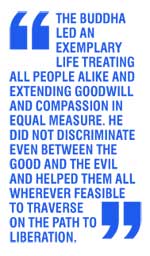Reply To:
Name - Reply Comment
Last Updated : 2024-04-25 09:32:00
.jpg)
 The Orders of Bhikkhus and Bikkhunis were open to all people irrespective of caste, wealth and social status. Actually, some of the distinguished members of these orders were from the so-called low castes. In fact, those entering these Orders had to change their names and titles so that they did not indicate their rank and birth in lay life.
The Orders of Bhikkhus and Bikkhunis were open to all people irrespective of caste, wealth and social status. Actually, some of the distinguished members of these orders were from the so-called low castes. In fact, those entering these Orders had to change their names and titles so that they did not indicate their rank and birth in lay life.Thanga Thursday, 24 May 2012 11:32 PM
Well said, but who is listening? The Buddhism in Ceylon is unique. It is Sinhala Buddhism, not the lofty Dharma preached by Buddha.
Ravi Friday, 25 May 2012 04:12 AM
there is nothing called sinhalese budhism , its only one great philoshy of this grest human being listen to it and act along with it than finding origin of buddhism.
Prasanna Friday, 25 May 2012 05:43 AM
My dear Friends we are all ways praiseing the Buddhism but who is following it. take note what our Buddhist monks did to the Muslim Mosqe.just take a look surrounding the templs next to the lique shops and Brothels some of them are rentted out from the Templs.lets follow it.
aji Friday, 25 May 2012 11:21 AM
Underminning of prevelidges & rights of majority by sheer insultive comments bring nothing but disorder in peace & hormoney in our societies. Whether it’s minority or majority they should refrained from commentings other religions , beliefs & practices of them. Despite they should have their own internal cristism within their own beliefs & practices which can contribute to co-existence . How it can be sincere when someone publicly critisis other epoples in way that hurts some others’ genuine interests & rights .
aji Friday, 25 May 2012 11:23 AM
No one can asked other to follow any principles but themselves. The practice & belief presently followed by Sinhalase is Sinhala Buddhism. It not discreminating any other to follow greatest teachings of the Buddha so we can have Tamil Buddhist, Arab Buddhist or Malay buddhist. Theresfore there are no needs to cristisis about Sinhala Buddhism , any one can follow the great Philosohy with their practices if their genuinly interest. While not being worrrying about how Sinahala people practice Buddhism.

Add comment
Comments will be edited (grammar, spelling and slang) and authorized at the discretion of Daily Mirror online. The website also has the right not to publish selected comments.
Reply To:
Name - Reply Comment
US authorities are currently reviewing the manifest of every cargo aboard MV
On March 26, a couple arriving from Thailand was arrested with 88 live animal
According to villagers from Naula-Moragolla out of 105 families 80 can afford
Is the situation in Sri Lanka so grim that locals harbour hope that they coul